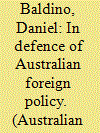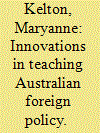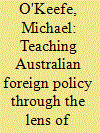| Srl | Item |
| 1 |
ID:
170405


|
|
|
|
|
| Summary/Abstract |
While interrelated issues and challenges can only expand, the study of foreign policy in Australia is not a very healthy discipline. While not wholly wedged on life-support, there are genuine grounds for concern about the decline of Australian foreign policy (AFP) as a subject for serious academic concentration and its position as a marginalised topic of analysis. Unfortunately, attempts to reinvigorate the field continue to contend with a number of ingrained biases. AFP can be incorrectly dismissed as muddled and marginal while major debate points in the field are often glibly portrayed as broadly settled. This is despite the that fact that it can provide unique insights into policy-making in the twenty-first century while teaching students the benefits of problem-solving through a multi-disciplinary lens. Additionally, there is an ever-changing, contested set of knowledge that future leaders will need to consider in order to be successful, critical thinkers in a multi-agency environment. This will continue to incorporate an evolving variety of significant issues that constitute both conventional and unconventional threats to national interests.
|
|
|
|
|
|
|
|
|
|
|
|
|
|
|
|
| 2 |
ID:
170408


|
|
|
|
|
| Summary/Abstract |
More than ever as the uncertainties of a digitalised world are upon us and where power shifts to and within the region disrupt the familiar patterns of engagement, the acquisition of the knowledge and competencies necessary for Australia to be a trusted international partner are pressing matters. So too, in the development of both personal and professional skills, our pedagogic remit to students guides us to assist them in learning more about themselves in the process. How, then, should we teach Australian foreign policy and in doing so grow the conjunctive tissue of student self-learning in order to prepare students for the world of diplomacy necessitated by Australia's international workspace? Here, experiential learning can have a powerful effect in the teaching of Australian foreign policy and in the development of students' life and professional skills. Both in-person simulations situated within the context of a thoughtful curriculum, and short-term international mobility study tours can contribute to an effective mix of learning experiences and assist us in moving closer toward effective practice in the current uncertainties and an era of digital transformation.
|
|
|
|
|
|
|
|
|
|
|
|
|
|
|
|
| 3 |
ID:
170409


|
|
|
|
|
| Summary/Abstract |
Australian foreign policy is often taught in a purely descriptive way or as a case study for critiquing various international relations theories. Neither approach does justice to the rich historical traditions in foreign policy making in Australia or to the trends shaping the way students are exposed to foreign policy issues in the digital age and teaching can be enhanced if these trends are engaged with. Reflection on Australia's unique strategic culture can provide a pluralistic narrative plot that connects both IR approaches to particularistic attributes of AFP practice and also the lived experience of students with current events as they unfold.
|
|
|
|
|
|
|
|
|
|
|
|
|
|
|
|